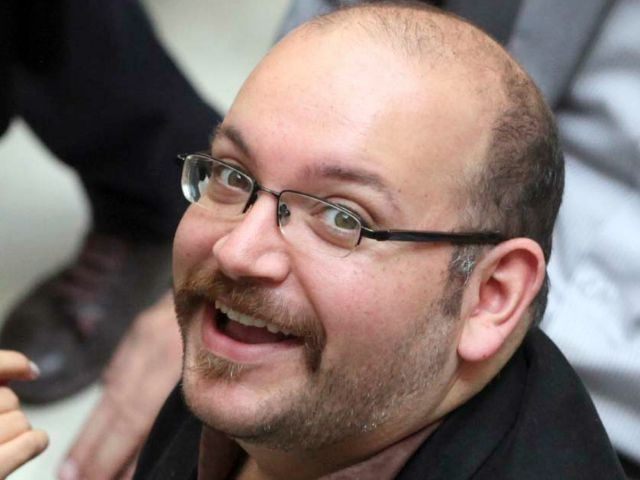One way or the other, the “legal” ordeal of a Washington Post reporter held captive in Iran appears to be winding down. According to Washington Post executive editor Martin Baron, a final hearing in the secret “espionage” trail of Jason Rezaian was held on Monday, and will be the final hearing before a verdict is reached. Rezaian has been a already prisoner of the Iranian regime for over a year.
Baron said this was a “critical moment” in what he described as a “sham trial.”
“Iran has behaved unconscionably throughout this travesty of a case. It has imprisoned an innocent journalist for more than a year and subjected him to physical mistreatment and psychological abuse,” said the Washington Post executive editor.
The paper has petitioned the United Nations panel on arbitrary detention for assistance, including complaints about “what the publication described as Rezaian’s ill-treatment, including long stretches of solitary confinement.”
The Post reports that the New York-based Committee to Protect Journalists has “appealed to the head of Iran’s judiciary to ensure that the case is ‘resolved immediately and that Jason returns to his family.'” Immediate resolution would be a highly relative term in this case, since the “trial” has technically been in progress since May, but Rezaian has only attended closed-door court hearings three times to date.
Protests have also been lodged by the Obama Administration, in the usual passive-aggressive voice it takes with the Iranian regime. “We’re aware of the reports of another possible upcoming court appearance for Jason Rezaian,” said State Department spokesman Mark Toner on Saturday. “We continue to call for his immediate release, as well as that of Saeed Abedini and Amir Hekmati. And for Iran to work with us to locate Robert Levinson, so that all may be returned to their families.”
The Washington Post runs down the other three Americans held captive (or, in Levinson’s case, possibly killed) by those honest, reliable, peace-loving statesmen of Tehran:
Abedini, who has been in Iranian custody since September 2012, was convicted on security-related charges that include claims of proselytizing.
Hekmati, detained in August 2011 during a family visit to Iran, was convicted in 2012 on espionage and other charges. A death sentence against him was later commuted to 10 years in prison, according to the family’s Web site.
Levinson, a former FBI agent and CIA contractor, was last seen publicly in March 2007 on the Iranian resort island of Kish, where he was investigating cigarette smuggling on behalf of a client. Iran denies knowledge of Levinson’s whereabouts or any involvement in his disappearance.
The New York Times reports that Monday’s hearing was said to involve Rezaian presenting his “final defense,” although the judge – described as “notoriously hard-line” – may yet order further hearings. Rezaian’s wife and mother were denied entry to the courtroom, so they gave a press conference outside in which his mother said the trian had become a “political issue,” and called upon Iran’s supposedly independent judiciary to assert its independence by holding a public trial, instead of endless secret hearings.
“They cannot prove that he is a spy, as there is no evidence,” Rezaian’s mother declared.
According to the NYT, Rezaian could face a sentence of up to 20 years, and would be given a chance to appeal if convicted.
CNN Money’s take on the trial is an amusingly naive: “At times Rezaian has seemed like a pawn in a geopolitical face-off. In recent weeks Rezaian’s supporters have become guardedly optimistic that the recently-announced nuclear accord between Iran and five world powers will help ease the way toward his release.”
Most rational people think that’s the sort of detail that should have been hammered out before Iran was given nuclear weapons, international prestige, and $150 billion to spend on sponsoring terrorism. As it stands, the best hope for Rezaian’s supporters is that Iran worked out a secret deal with Obama and Secretary of State John Kerry to dramatically release its hostages at a crucial moment during debate over the nuclear bargain in the U.S., with a smattering of praise for the diplomatic skills of the President.

COMMENTS
Please let us know if you're having issues with commenting.